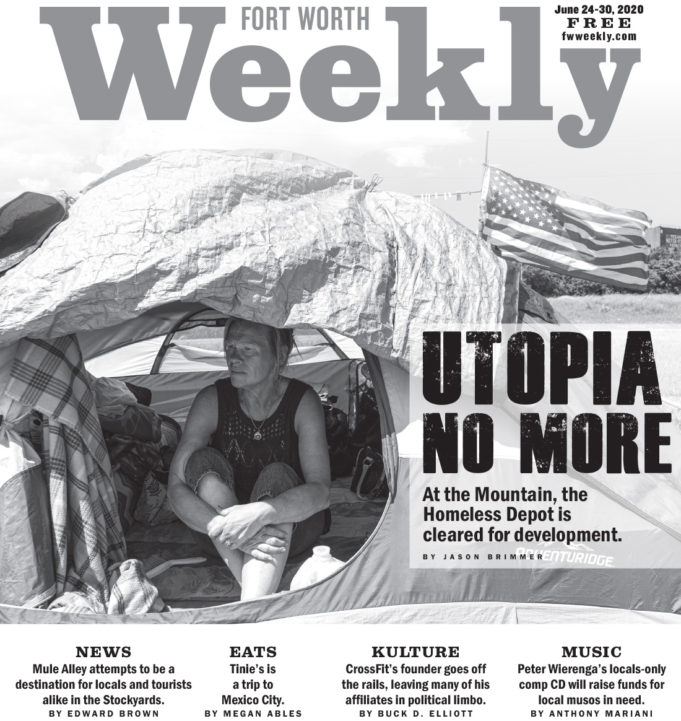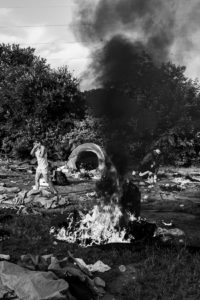
Photo by Jason Brimmer.
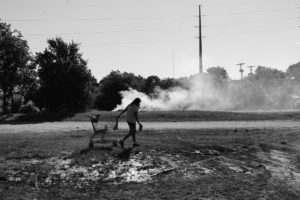
Photo by Jason Brimmer.

Photo by Jason Brimmer.
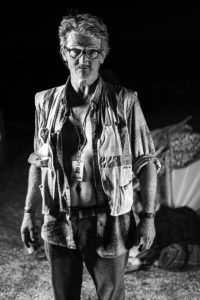
Photo by Jason Brimmer.
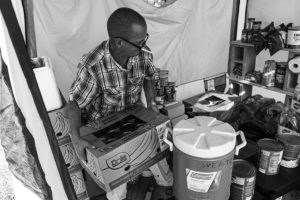
Photo by Jason Brimmer.
The fire had been burning continuously for the last three days, ever since the eviction order had come down. What had started simply as old blankets and wind-torn tent panels smoldering in an old oil barrel was threatening to turn four-alarm. A crowd had grown around the fire, near enough to feel the heat but not so close as to draw the ire of the woman who was feeding the blaze.
An old truck tire landed on the fire pit with a thud, sending ash blowing out across the top of the Mountain in great gray-black plumes. The woman coughed and staggered back. The tire caught, and a burst of poisonous-smelling black smoke billowed three stories high above the camp. Something popped inside the fire, and thin, slate-gray smoke trails arched up. The woman laughed as several butane bottles landed near the feet of the retreating crowd.
“You are crazy,” someone yelled.
Shopping carts overflowing with sleeping bags, tent poles, and cast-off backpacks rattled and banged as they were pushed away from the pyre and down the hill, scattering like ash in the wind.

Photo by Jason Brimmer.
“A little bit of history was being made here,” Danny had told me earlier that day. He had fought hard to keep his composure, but the realization that everything that he had worked so hard to build was in ruins was just too much. He blinked away some tears, and, even though a sudden swell of emotion had caused his words to crack and falter, he continued. “If it had just been allowed to go on a little longer, this thing would have grown.”
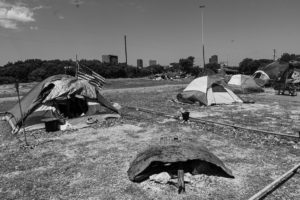
To create something that would grow, last, and protect –– that had been the idea when Danny and nearly 120 others had come together to create what would be, for a brief time, the safest, most tranquil homeless camp ever established on East Lancaster Avenue.
Danny helped establish what would eventually be called the “Homeless Depot.” The Depot itself was a series of large tents grouped tightly around a central pavilion, which housed two plastic folding tables set up under a wide blue tarp.

Donations would be dropped off at the Depot, where a team of homeless residents would sort through the clothes, food, or camping gear and quickly disperse the supplies to one of the many storage tents or to the food pantry. Bottled water stayed stacked on the plastic tables, as did boxes of hygiene products and OTC medications.
All day, every day, work was being done at the Depot. Trash bags were filled with food and water and delivered to each of the 90-odd tents on the Mountain. Clothes were collected and taken away to be washed. Tents and sleeping bags were handed out to whomever was in need provided he worked for it. All that was required was to fill up three bags with trash.
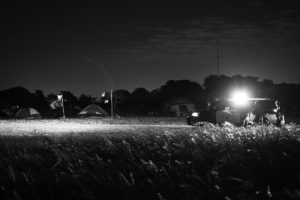
Photo by Jason Brimmer.
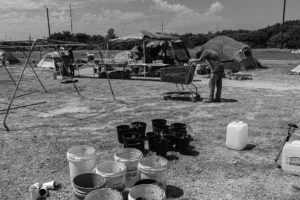
Photo by Jason Brimmer.
Once earned, the tents had been put down in a kind of grid, most facing the same direction, and many had yards marked off by long pieces of wood or cord tied to stakes. Clotheslines were strung. Flags waved. Upturned water bottles fed small tomato plants that had just begun to take root in soil-filled five-gallon buckets.
When the eviction order came down, it was not from the usual places, not code compliance and not from the Fort Worth police department either. The owner had sold the property, and development was happening. Drones began to survey the site the day the order was issued. Change came quickly to the Depot after that.
Donations dried up. The system broke down. No one paid for a bed roll with bags of trash. These things were taken now, earned through force.
Rationing was abandoned, and the food pantry was opened, leaving only a few Costco-sized cans of corn rolling around on move-out morning. The Depot had been picked clean. Someone had wanted the five-gallon buckets so desperately that he had dumped them all, littering the Depot pavilion with mounds of dirt and withered tomato plants.
“We mowed our lawns,” Danny said as he looked away from what was left of the Depot. “Did you know that? That was the first some of us had done that in a long, long time. We got to feel like this was a home, our home. We made it a home, I guess. For a lot of us, this was the first time that we got to feel some dignity, the first time since we became homeless.”
I stayed on the Mountain, at the Depot, until the bitter end, watching people push all their earthly possessions away in bent and rattling shopping carts. More fires were set. The lines that formed around the black tar vendors put Space Mountain to shame.

It is a tragedy that modern sentiment regards hope with such irony and disdain. It was not the free and seemingly unending flow of donations into the Depot that made it thrive –– plenty of shelters have more resources and still end up miserable places. The people who lived on the Mountain did not mow their lawns because they had access to lawnmowers but because they were proud of the homes they had made. No one will spend hours in the Texas heat filling up three bags full of trash just to trade it for a tent unless he knows he is buying more than shelter. He must believe that he is buying a place to stay, a place that could be something like a home.
I stayed until the fires burned out and the surveyor drones began to buzz like flies around a body. Before Danny left, I asked him what this place, the Depot, had meant to him, and he answered, “Everything. I told God that I would like to be able to give back once I got back on my feet, and he used me to give back while I am, well, while I am still off of my feet. This place, this opportunity, it has meant everything to me. It gave me a chance to help, and I think that I did good.
“By tomorrow we will all just go back to Lancaster, and it will be like none of it ever happened,” Danny said after a moment. “It’s a shame, you know, because this worked. This worked so well.”



